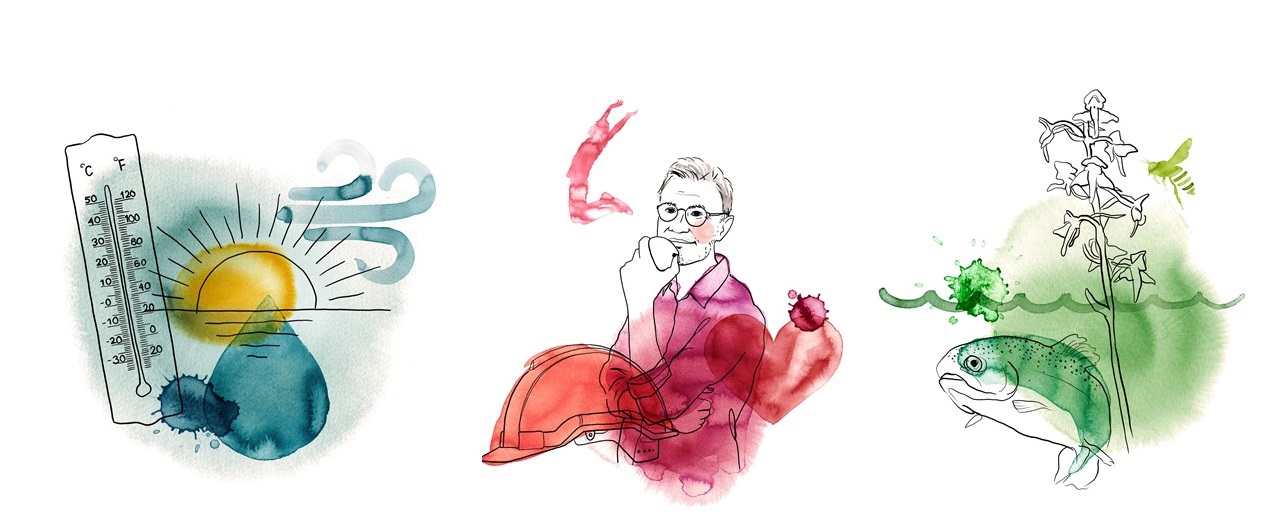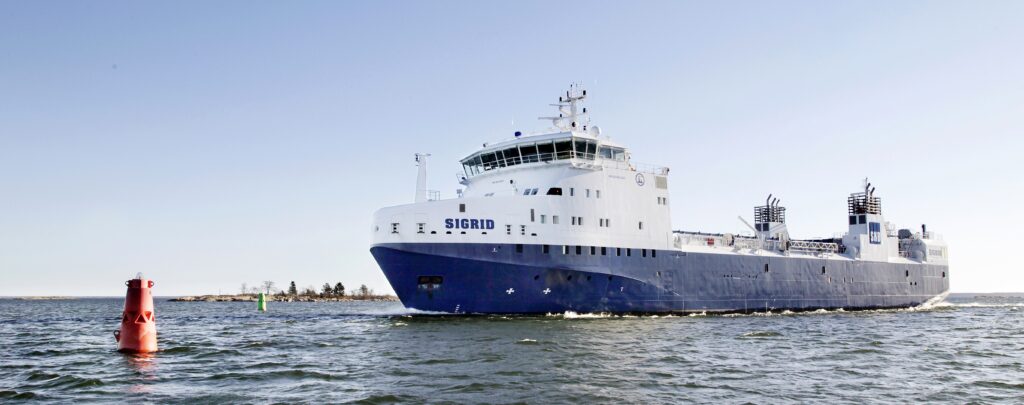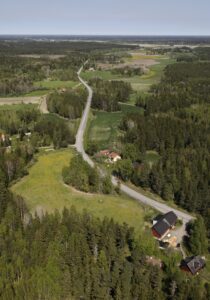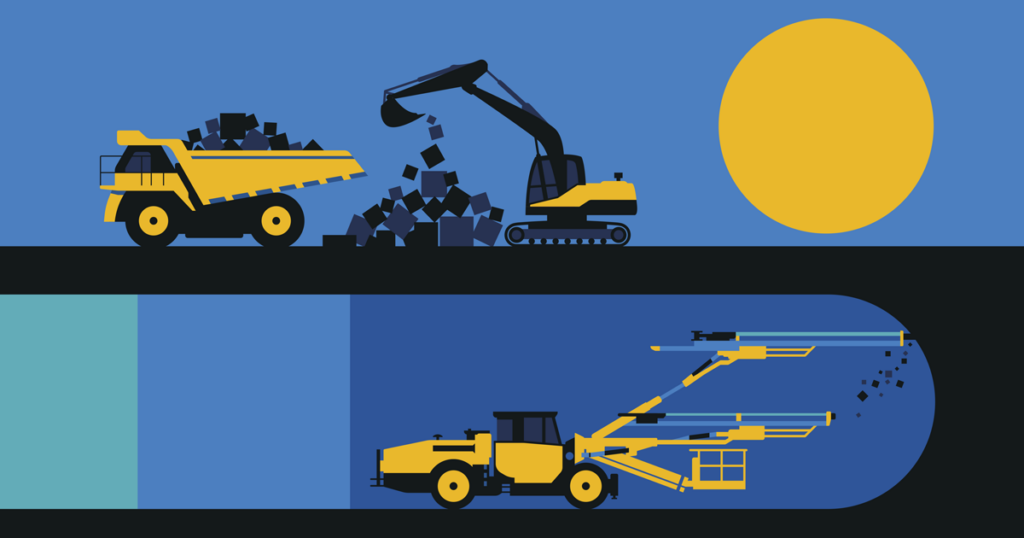Important steps to combat climate change and contribute to sustainable development
Working towards sustainable development by combating climate change, promoting human rights, a good work environment, education and a more equal allocation of the world’s resources is attracting increasing attention, both globally and nationally. With its “Roadmap for Sustainable Construction and Operation”, SKB sets out the direction of its sustainability work.
The Roadmap for Sustainable Construction and Operation is the name of SKB’s sustainability programme. It has been developed to ensure that SKB’s main undertaking – to take care of spent nuclear fuel and radioactive waste from Swedish nuclear power plants in a safe manner – is performed sustainably throughout the value chain.
Multiple stakeholders involved
It is not only SKB itself that has requirements and expectations of what SKB actually does for sustainable development. The company’s main owners, Vattenfall, together with the county administrative boards in Kalmar County and Uppsala County in their role as supervisory authorities, the host municipalities Oskarshamn and Östhammar, as well as current and future employees, are all important stakeholders in this work.
The sustainability programme clarifies how SKB is responding to the requirements and expectations of the world at large, and what the goal is for its sustainability work. The programme describes a large number of measures to be implemented in five different priority areas.

Reduced emissions through climate-smart construction projects
“SKB’s operations will be resource-efficient and fossil-free, with net zero greenhouse gas emissions, by 2040.” This is the wording of the ambitious vision for the area of Limited Climate Impact. This vision is in line with the so-called 1.5 degree target. To achieve the ultimate target, there are also interim target to reduce emissions from the current level by 20% by 2025, and by 50% by 2030.
In addition to finding ways to reduce the carbon footprint of our existing facilities, it also means that SKB must work with a sustainability perspective in upcoming major construction projects.
– It’s crucial that our new, extended facilities have requirements specified and are designed from the outset so that they can be both built and operated in an energy-efficient, climate-smart way, says Johan Hedlund, Head of Asset Management at SKB.
– What we’re planning for today, in everything from material selection to the choice of suppliers, will form the basis of the climate impact from our facilities throughout their operational lifetime, Johan continues.
This area thus includes important perspectives on how future facilities are to be designed, and how the actual construction will be carried out in order to save resources and reduce the carbon footprint during the construction period.
One example is that SKB will be desalinating salt water from the Baltic Sea during the construction of the extended Final Repository for Short-lived Radioactive Waste (SFR) and the Spent Fuel Repository, in order to avoid having to draw on the municipality’s freshwater resources. Renewable fuels or electricity will also be used as far as possible to power vehicles during the construction phase.
More efficient operation of existing facilities
There is much that can be done to streamline and reduce emissions at existing facilities. One specific facility that lies at the heart of this work is SKB’s transport ship m/s Sigrid. This ship accounts for a large part of the current climate footprint, and one important element of the work is to alter the fuel mix so that it includes renewable fuel. m/s Sigrid recently started to use a 10% admixture of non-fossil HVO fuel, a level that is above the requirements being discussed at EU level.

Limiting climate impact therefore requires many steps and important preparations ahead of SKB’s major projects, but the sustainability plan encompasses issues both big and small. It includes, for example, reviewing how important journeys are made between facilities and offices, but also how the number of face-to-face meetings can be reduced in favour of digital meetings.
SKB acquired a lot of relevant experience during the pandemic, when a large proportion of employees were forced to work from home, and new tools for collaboration and meetings had to be developed. There are now fewer restrictions at SKB’s offices, but continuing to allow a degree of working from home and making use of digital meetings have created flexibility for employees and enabled a reduction in emissions.
Sensitive natural environments with high natural values
SKB’s existing and planned facilities and offices mean that areas of land and water need to be utilised for, and will be affected by, operations. By selecting suitable locations for operations and adapting the structure of the facilities and transportation, intrusion, emissions, disruption and consequences for people, nature and the environment are avoided or mitigated.
There are sensitive natural environments in the Forsmark area with high natural values, and there are also a number of protected species there. The sustainability programme’s Ecosystems and Biodiversity area specifies that SKB will not only ensure that nature and biodiversity are preserved, but also contribute to improving the environment. SKB has been working on a number of activities in this area for a long time, and is planning both preventive measures and specific protective measures.
Frog hotel and bird sanctuary
This range of measures includes annual inventories of protected species, conservation measures to promote the fen orchid, undertaking maintenance of rich fens (a kind of nutrient-poor and mineral-rich marsh) and signing nature conservation agreements on forest properties where deciduous trees are to be encouraged and continuous cover forestry is to be practiced. By prohibiting certain work during the period 1 April to 31 July, SKB will also make it possible for red-listed bird species to breed in peace and quiet in the area.

Work to secure the population of both pool frogs and crested newts has been in progress for several years. Among other things, SKB has built new ponds for the amphibians and created a so-called frog hotel on the site, where the frogs can spend the winter. Many frogs have already moved of their own accord, but in 2023 and 2024 it is intended that those that are still in the old ponds will be moved.
In 2020, SKB signed sustainability pledges within the Uppsala County Administrative Board’s regional action programme for ecosystems and biodiversity, as well as within the action programme for reduced climate impact. Work is in progress to fulfil these sustainability pledges; the programme is in its final year and will be summarised in 2023-24. A possible extension is already being considered, with the possibility of signing new promises.
Health and safety take top priority
World class health and safety: this is the goal for SKB’s work in the area of Personnel, Health and Safety. This area includes not only work to prevent accidents and injuries, but also the important task of promoting a healthy work environment where everyone can be themselves and thrive.
Safety forms the very basis of SKB’s work. Both existing facilities and the future final repositories will be of importance for people and the environment for a long time to come. It is therefore natural that SKB has a safety mindset that pervades all its work.
SKB works systematically on health and the work environment, but this is also an issue that is particularly important for the upcoming major construction and civil engineering projects, which bring strict requirements and important challenges. Ensuring that workplaces are safe and secure throughout the supply chain is key to complying with SKB’s principles that health and safety always take top priority.
In practice, this means that SKB checks compliance with occupational health and safety requirements and regulations, and also works with factors such as security, as well as order and tidiness at workplaces, in order to create the right conditions for healthy work.
The goal is to maintain a safety culture that employees feel “in their bones” and is thereby reflected in how they act in their work.
Contributing to a sustainable society
SKB wants to be an active part of the local community in the municipalities where its operations are conducted, and to contribute to positive, sustainable social development. This is the vision within the sustainability programme’s Local Community area.

– SKB has very long-term operations, where we depend on a well-functioning local environment, says Stig Björne, Head of Unit at the Communications Department.
– We need a good infrastructure, the opportunity to recruit employees, and housing. That’s why it’s important that we help to make Oskarshamn and Östhammar municipalities attractive locations with well-functioning local communities, Stig continues.
SKB does this by creating jobs and investments through its operations and with the so-called added-value agreement, which includes contributing to developing infrastructure in the municipalities.
Sustainability is always a factor in assessing potential value-added projects. One goal is also to work with the municipalities to identify specific sustainability projects of common interest, projects that in turn contribute to mitigating climate impact or to preserving and improving the conditions for ecosystems and biodiversity. Caring for the local community can mean making sure not to waste fresh water resources during construction works, reducing noise for neighbours and local residents, and investing in infrastructure projects, such as the upgrading of county road 288 to promote faster and safer travel.
It also has to be an obvious element of the operations that we are on site, accessible and open, both to inform and to receive viewpoints from decision-makers, citizens and other stakeholders.
Sustainability at multiple levels
The final area of the sustainability programme, Sustainable Supply Chain, focuses on the importance of ensuring that the targets highlighted in other areas do not apply only to SKB’s own organisation. In its work on the forthcoming construction and civil engineering projects, SKB will use contractors and wants to make sure that everyone assumes responsibility for sustainability, safety and environmental aspects throughout the supply chain.
This entails that SKB’s requirements for health, safety and the environment must be applied in all procurement processes, so that the entire chain contributes to achieving the goals of the sustainability programme. This means that these aspects are considered when selecting suppliers, and that there are systems in place to follow up on the work of suppliers. It also applies to practical guidelines such as, for example, in connection with transportation and vehicle purchases, specifying requirements for electric power or non-fossil fuels wherever possible with regard to function and, especially, radiation safety.

SKB wants to collaborate with the right suppliers who have equally ambitious goals, and to both specify requirements and challenge suppliers within the different focus areas. Through close collaboration with clear communication, SKB wants to ensure that requirements are included at all stages and that the visions set out in the sustainability programme become something that the entire chain works to achieve.
An important task that we perform together
Sustainability is a term that is being used increasingly often, as communities, companies and individuals review how to reduce their negative impact on the climate and society. It’s a word that is easy to use, but it’s also one that needs to be filled with content. With its new sustainability plan, SKB wants to ensure that the concept is linked to clear measures that are important steps to combat climate change and contribute to sustainable development.
This is a great ambition that will not be achieved by concepts and plans alone, but it is one that SKB hopes to be able to achieve with the help of clear initiatives, both large and small, such as adopting a climate-smart approach during the construction of a unique final repository, letting frogs move into hotels, safeguarding a good work environment, promoting local sustainability projects, and making sure that a sustainability mindset is a focus for both SKB and contractors. The plan is wide-ranging and encompasses many parts and actors, but sustainability is also a task that people do best when they do it together.
Sustainable development
The term “sustainable development” was introduced by American environmental scientist and author Lester R. Brown in 1981. It gained international recognition in 1987, when the UN World Commission on Environment and Development launched the term in its report entitled “Our Common Future”.
Norway’s then Prime Minister Gro Harlem Brundtland, who headed the Commission, defined sustainable development as follows: “Sustainable development is development that meets the needs of the present without compromising the ability of future generations to meet their own needs.” This is still the most common definition.
In 2015, the UN’s 17 Sustainable Development Goals were adopted. The aim of these goals is to achieve social, environmental and economic equality, fairness and sustainable development by 2030. The planet and the environment set the parameters that constitute the preconditions for sustainable growth and social development, and they are not negotiable.
Sustainable development is based on three dimensions: social, environmental and economic.
Last review: April 13, 2023
About SKB
Last review: April 13, 2023